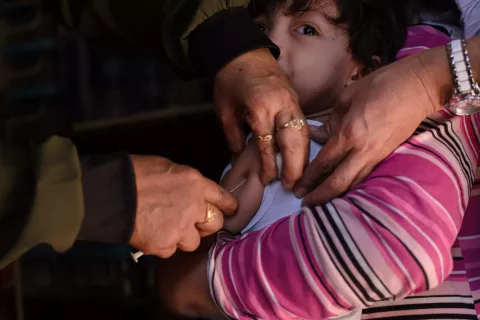UNICEF raises appeal for children affected by Typhoon Rai to US$39 million
On-ground assessments reveal greater needs of children and families in hard-to-reach areas

GENEVA/NEW YORK, 3 February 2022 – UNICEF revises its emergency fundraising appeal for children affected by Typhoon Rai (locally named Odette) from an initial US$11.5 million to US$39 million. More than a month after the Super Typhoon hit the Philippines, assessments reveal that the needs of affected families are greater than initial estimates. Of the sixteen million affected people, an estimated 2.4 million people, including 912,00 children, need assistance. UNICEF’s appeal targets 492,000 people and 293,000 children, focusing on the hardest-to-reach and impoverished families.
“Children in typhoon-affected areas in the Philippines were already suffering from the impact of COVID-19 to their health and well-being. Super Typhoon Rai dealt another blow to their health, nutrition, education, and protection. The impact of extreme weather events, the climate crisis and the pandemic has changed their situation for the worse. There is no time to waste. Every day that goes by is a missed opportunity for these girls and boys. Let’s stand with these children as they build the futures they deserve. They need urgent help now,” UNICEF Philippines Representative Oyunsaikhan Dendevnorov says.
The funds will allow UNICEF to address immediate life-saving needs, help children recover from the effect of the Typhoon and scale up COVID-19 mitigation and response, especially for the most disadvantaged.
UNICEF's water and sanitation programme will establish safe, sustainable water supply systems, sanitation facilities, distributing hygiene kits and information. Due to the significant unmet needs in this area and to prevent the risk of disease outbreaks, UNICEF is prioritizing the provision of clean water and sanitation.
Providing life-saving health and nutrition interventions, including measles vaccination for children and access to primary health care services will be conducted through community-based activities for affected populations. Expanding its Risk Communication and Community Engagement strategies will reach more families with essential information. UNICEF will also support nutrition services targeting children under the age of five and pregnant/lactating mothers.
Using government-supported social protection schemes, the most vulnerable children and families will receive cash assistance.
UNICEF will work with the Department of Education to support the safe reopening of schools, restore immediate access to education in safe and secure learning environments, and prevent accumulated learning loss among children. In addition, infection prevention and control measures, including hygiene promotion, will be mainstreamed in services supported by UNICEF.
Prevention campaigns and specialized services will target survivors of gender-based violence. UNICEF aims to scale up its mental health and psychosocial support programme to mitigate the impact of the disaster on children’s well-being and support their recovery. UNICEF will empower youth to become active contributors in their own communities.
“UNICEF has been active in the Philippines for 75 years. Our field presence and expertise in emergency response in the country enables us to deliver high-impact results for children. The Philippines is also one of the most emergency prone countries in the world and bears the brunt of the effects of climate change,” Dendevnorov concludes.
#####
Note for editors:
Additional resources and multimedia materials available here: https://weshare.unicef.org/Package/2AMZIFZ0BUZH
Media contacts
About UNICEF
UNICEF promotes the rights and wellbeing of every child, in everything we do. Together with our partners, we work in 190 countries and territories to translate that commitment into practical action, focusing special effort on reaching the most vulnerable and excluded children, to the benefit of all children, everywhere.
For more information about UNICEF East Asia & Pacific and its work for children, visit www.unicef.org/eap
Follow UNICEF East Asia & Pacific on Twitter , Facebook and Instagram





